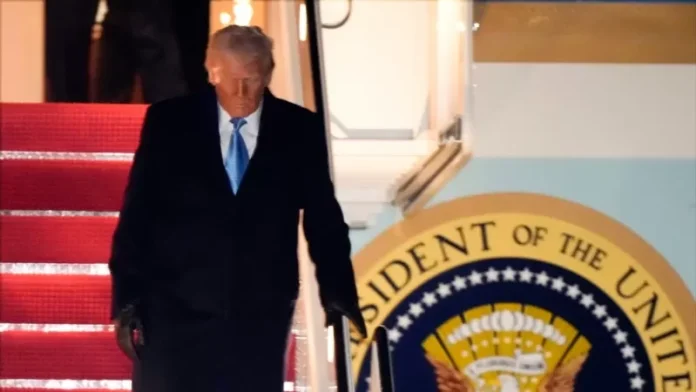Washington, D.C. – U.S. President Donald Trump has stated that he has not yet seen the proposal being discussed by Arab leaders as an alternative to his plan to take over Gaza once the war between Hamas and Israel ends.
During a press conference on Air Force One, Trump responded to a reporter’s question about the proposed plan by saying, “I haven’t seen it yet. Once I do, I will let you know.” This comes after Trump announced earlier this month his intentions to forcibly relocate almost 2 million Palestinians from Gaza into neighboring Jordan and Egypt, with plans to turn the territory into the “Riviera of the Middle East.” However, this proposal was met with rejection by Arab countries.
It is unclear whether Trump’s statement about not seeing the proposal is serious or simply a tactic to extract concessions from Arab states. In a meeting with Saudi Crown Prince Mohammed bin Salman in Riyadh this week, U.S. Secretary of State Marco Rubio suggested that it could be the latter, urging regional leaders to make a counteroffer.
Envoys from Egypt, Jordan, Saudi Arabia, Qatar, and the United Arab Emirates are set to meet on Friday in Riyadh to discuss potential options, including an Egyptian plan to raise up to $20 billion over three years from Arab and Gulf states for the reconstruction of Gaza. Under this plan, Gazans would not be forced out and the strip would be governed by Palestinians.
Trump’s remarks come after he delivered a speech at a conference in Miami hosted by the Future Investment Initiative Institute, the nonprofit arm of Saudi Arabia’s Public Investment Fund – the kingdom’s sovereign wealth fund led by Crown Prince Mohammed bin Salman. This marked the first time a U.S. president has addressed the annual gathering of global financiers and tech executives, highlighting the close ties between Trump and the Saudi crown prince.
Laura Blumenfeld, senior fellow at the Johns Hopkins School for Advanced International Studies, commented on the relationship between Trump and Crown Prince Mohammed bin Salman, saying, “Trump believes in the Golden Rule, but not the Golden Rule from Sunday school. It’s if you’re rich, you’re right.”
As Riyadh takes the lead in unifying Arab nations to support post-war Gaza, there are signs that Trump may be softening his demand. In his speech, Trump did not mention Gaza beyond repeating his role in brokering the ceasefire signed on January 19, during the last day of then-President Joe Biden’s term.
“We’ve secured a ceasefire in Gaza, and we’re bringing in the hostages, and we’re bringing them home to their families,” Trump said, adding that some of the hostages “are in pretty bad shape.” He also praised Yasir Al-Rumayyan, governor of the Saudi wealth fund, and Saudi Finance Minister Mohammed bin Abdullah al-Jadaan.
It is unclear if Trump met with any members of the Saudi delegation during the event, as the White House did not immediately respond to VOA’s query.
The Egyptian proposal for Gaza includes the establishment of “secure areas” equipped with mobile houses and shelters, while Egyptian and international construction firms work to rebuild the devastated infrastructure. It also calls for the formation of a national Palestinian committee of technocrats and community leaders unaffiliated with Hamas to govern post-war Gaza.
However, it is uncertain if the plan has the support of the Palestinian Authority, the internationally recognized governing body of the West Bank, which previously administered Gaza until losing the 2006 election to Hamas.
Tariq Kenney-Shawa, U.S. Policy Fellow at the Palestinian Policy Network Al-Shabaka, stressed the need for a political solution in Gaza to ensure sustainable reconstruction and prevent a return to occupation. He said, “What is needed now is a political solution to Gaza to make that reconstruction both physically possible and long-term sustainable.”
Hamas, the militant group that controls Gaza, indicated a willingness to cede any post-war governance role. Hamas spokesperson Hazem Qasim told Al Arabiya TV, “It is not necessary for Hamas to be part of the political and administrative arrangements in the next phase for Gaza, especially if it serves the interests of our people.”
This statement comes as negotiations for phase two of the ceasefire are set to begin in the coming days, after weeks of delay. However, it only partially fulfills Israel and the United States’ key demand – the elimination of Hamas’ governance and military role in post-war Gaza.
Hamas has not shown any indication of disarming, while Israel

